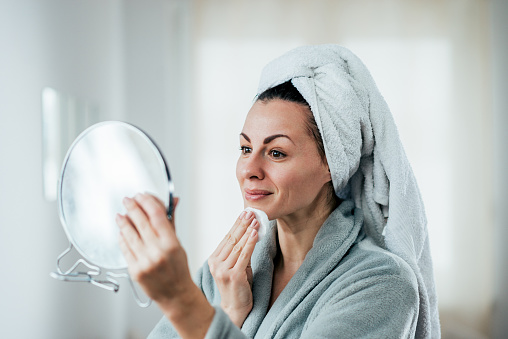Makeup Remover Wipes vs. Cleansing Oils: Which is Better?

Makeup Remover Wipes vs. Cleansing Oils: Which is Better?
Makeup remover is a beauty product or substance that removes makeup from the skin, particularly the face. It is designed to dissolve or wipe away makeup, including foundation, eye shadow, mascara, lipstick, and other cosmetic products.
There are various products to choose from when it comes to removing makeup. Makeup remover wipes and cleansing oils are popular options, but which is better? In this blog post, we will explore the pros and cons of each and help you decide which is right for you.
What are the types of makeup removers?
Makeup remover can come in many forms, including liquids, creams, oils, balms, wipes, and micellar waters. Different types of makeup removers are formulated to target different types of makeup and skin concerns, such as oily skin or sensitive skin.
What is the benefit of makeup remover?
Makeup remover is an important part of a healthy skincare routine, as leaving makeup on the skin can clog pores, cause breakouts, and lead to premature aging. It is recommended to remove makeup before bed to allow the skin to breathe and repair itself overnight. It's crucial to choose a makeup remover suitable for your skin type and concerns and to use it properly to avoid irritating or damaging the skin.
Now that we have explained what makeup removers are and their importance let’s dive into the day's topic.
The Pros and Cons of Makeup Remover Wipes and Cleansing Oils
Makeup Remover Wipes
Makeup remover wipes are convenient and easy to use. They come in small, portable packages that fit easily into a bag or suitcase for travel. They are also perfect for those nights when you're too tired to do a full skincare routine.
Pros:
- Convenient: Makeup remover wipes are perfect when on the go or in a rush. They require no water and can be used anywhere.
- Easy to use: Swipe the wipe over your face to remove makeup. No additional steps or products are necessary.
- Affordable: Makeup remover wipes range from $5 to $15.
Cons:
- Harsh on skin: Some makeup remover wipes can be harsh, especially if they contain alcohol or fragrance. This can lead to dryness, irritation, and even breakouts.
- Not environmentally friendly: Most makeup remover wipes are not biodegradable and contribute to waste.
- Ineffective: Some makeup remover wipes cannot effectively remove some types of makeup, especially waterproof or long-wearing formulas.
Cleansing Oils
Cleansing oils are a popular choice for those who want a more thorough and gentle way to remove makeup. They are typically made with natural oils and ingredients that work to dissolve makeup and dirt, leaving the skin clean and hydrated.
Pros:
- Gentle on skin: Cleansing oils are gentle and can even help to balance oil production.
- Thorough: Cleansing oils effectively remove all types of makeup, including waterproof and long-wearing formulas.
- Hydrating: Cleansing oils leave the skin feeling soft, supple, and hydrated.
Cons:
- Can be messy: Cleansing oils can be messy to use and require water to rinse off.
- More expensive: Cleansing oils are typically more expensive than makeup remover wipes, ranging from $20 to $50.
- Not suitable for all skin types: Some people with oily or acne-prone skin may find that cleansing oils are too heavy and can lead to breakouts.
So, which is better?
The answer is it depends. If you're looking for a quick and convenient way to remove makeup, makeup remover wipes may be the way to go. However, cleansing oils may be a better choice if you want a more thorough and gentle way to remove makeup.
It's important to choose a product that is suitable for your skin type and concerns. If you have dry or sensitive skin, opt for a gentle cleansing oil that won't strip the skin of its natural oils. If you have oily or acne-prone skin, look for a lightweight cleansing oil that won't clog pores.
Bottom-Line
In conclusion, both makeup remover wipes and cleansing oils have pros and cons. It ultimately comes down to personal preference and what works best for your skin type and concerns. By weighing the options and considering your needs, you can make an informed decision and find the right product.
